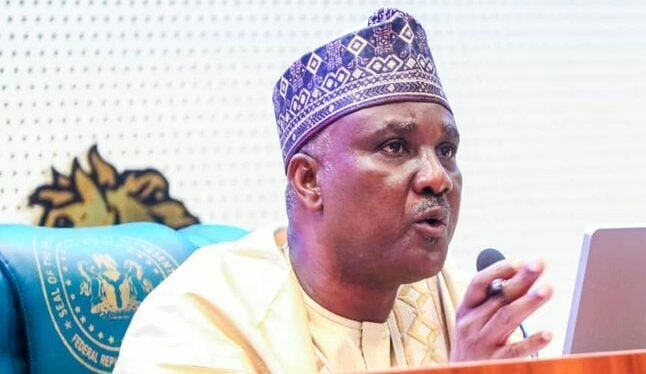The Rt. Hon. Abbas Tajudeen, Speaker of Nigeria’s House of Representatives, has once again expressed the legislature’s unwavering support for President Bola Tinubu’s borrowing strategy. He underscored its indispensable function in financing critical infrastructure projects, stimulating economic growth, and protecting vulnerable populations.
Speaking at the 8th Annual African Network of Parliamentary Budget Offices (AN-PBO) Conference in Abuja, Abbas addressed recent misconceptions regarding his earlier remarks on Nigeria’s debt-crisis-speaker-abbas-alert/” title=”Urgent Ale…: Speaker Abbas Raises the Alarm as …s Debt Skyrockets to N149 Trillion!”>debt situation, clarifying the official position of the House of Representatives.
Hosted by the Nigerian National Assembly in partnership with the National Assembly Budget and Research Office (NABRO), the conference centered on the theme: “The Role of Parliamentary Budget Offices in Fiscal Oversight Across Africa: Contributions Toward the African Union’s Agenda 2063.”
Represented by the House Leader, Professor Julius Ihonvbere, Abbas countered media reports that suggested the legislature was opposed to the president’s borrowing policies. He specifically referred to comments made at the 11th Annual Conference of the West Africa Association of Public Accounts Committees (WAAPAC), where concerns were voiced about Nigeria’s debt-to-GDP ratio, currently at 52 percent-surpassing the statutory ceiling of 40 percent.
“The speech delivered by the House Leader at the West Africa Parliamentary Conference was intentionally misrepresented,” Abbas clarified. “Claims that the House rejects President Tinubu’s borrowing framework are inaccurate and misleading.”
He reiterated that the National Assembly consistently endorses responsible and strategic borrowing aligned with Nigeria’s medium-term debt management strategy and global best practices.
“Much like many developed nations, Nigeria must occasionally resort to borrowing to fund essential infrastructure, drive economic development, and support marginalized groups,” he explained. “The crucial factor is that all borrowing must be purposeful, transparent, and sustainable.”
Abbas emphasized that under President Tinubu’s leadership, borrowed funds are being channeled into transformative sectors such as energy, transportation, and agriculture, with the goal of expanding the country’s revenue base rather than financing recurrent expenditures.
“The House fully endorses the President’s vision of utilizing prudent borrowing to accelerate economic progress, alleviate poverty, and strengthen oversight mechanisms,” he affirmed.
Highlighting fiscal challenges, Abbas noted that Nigeria loses an estimated $18 billion annually to financial crimes, equating to nearly 3.8% of the nation’s GDP, which underscores the urgent need for enhanced parliamentary fiscal oversight.
On a continental scale, he warned that Africa forfeits over $587 billion each year due to corruption, illicit financial flows, and systemic inefficiencies.
“Africa is at a critical crossroads,” he remarked. “With a population exceeding 1.4 billion-about one-sixth of the global total-our continent holds vast potential, yet the path to achieving the Agenda 2063 goals remains obstructed by significant challenges.”
He identified persistent issues such as widespread poverty, soaring youth unemployment, and inadequate infrastructure as major obstacles. As of 2024, approximately 464 million Africans live in extreme poverty, while around 12 million young people enter the labor market annually, with only 3 million formal jobs created-posing a serious socio-economic threat if left unaddressed.
“Effective management of resources can transform education, healthcare, and employment prospects across Africa,” Abbas stressed.
Also contributing to the conference, Professor Dumisani Jantjies, Chairperson of the African Network of Parliamentary Budget Offices (AN-PBO), cautioned that African economies remain vulnerable to external shocks such as volatile capital flows, disruptions in international trade, and climate change impacts.
He praised the essential role of Parliamentary Budget Offices in promoting fiscal transparency, ensuring policy accountability, and supporting evidence-based decision-making-key elements for realizing the African Union’s Agenda 2063.
“Our mandate is to provide legislatures with impartial, reliable, and data-driven analyses to enable sound fiscal policymaking,” Jantjies stated.
He also lauded Nigeria’s recent macroeconomic reforms, noting that the country’s economic growth reached 3.4 percent in 2024-the highest in a decade-while cautioning that inflation and poverty remain persistent challenges.






















